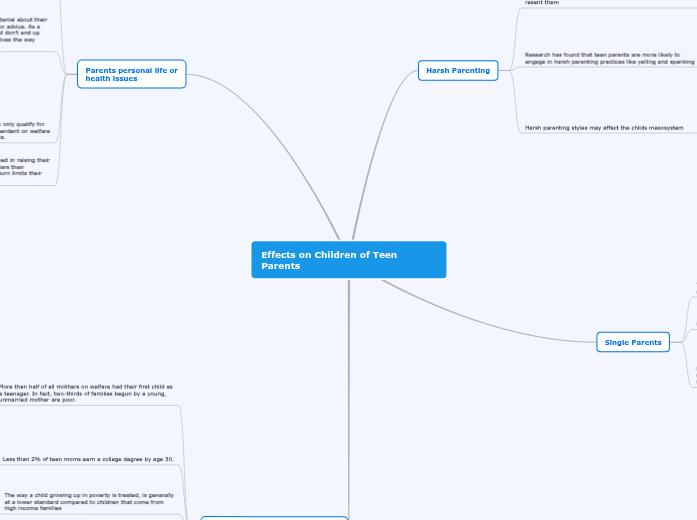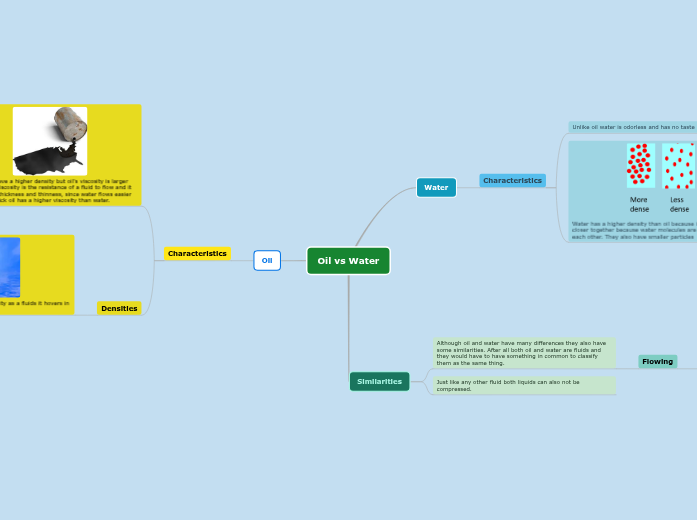Effects on Children of Teen Parents
Children of teen parents are
more likely to grow up in poverty
The state of poverty children live in affects their overall
microsystem (ecological systems theory)
The microsystem can be affected by factors
such as home life, school, daycare, peer group
or the overall environment the child is used to
Poverty can affect all of these things
The quality of schools and daycares for
a child in poverty is quite low when compared
to high income families
This will affect how the child
grows up and learns since this will
be a part of the child's microsystem
Poverty and Teen Pregnancy
"If you finish high school, get a job, and get married before
having children, you have a 98% chance of not being in poverty"
Shows the close relation of teen pregnancy
and poverty
The way a child growing up in poverty is treated, is generally
at a lower standard compared to children that come from
high income families
Interactions within the microsystem typically involve personal relationships with family members, classmates, teachers and caregivers, in which influences go back and forth
How these groups or individuals interact with the child will affect how the child grows
Less than 2% of teen moms earn a college degree by age 30.
Lower education levels overall lead
to less annual income
This leads to their children being
less likely to attend college
In addition, research shows that the younger a mother is, the more likely her child will have a lower IQ.
Only 40% of teen moms finish high
school
More than half of all mothers on welfare had their first child as a teenager. In fact, two-thirds of families begun by a young, unmarried mother are poor.
The poverty level for a household is $26,000
yearly income
The average yearly income of a teen parent is
$20,000
Parents personal life or
health issues
Although teen fathers often want to be involved in raising their children, having children at a young age hinders their educational achievements, as well, which in turn limits their long-term earning power.
Parents may look at the child as the root of the problem
This can lead to frustration often taken out on the child
Since teen mothers often quit school and can only qualify for jobs that pay poorly, they are commonly dependent on welfare and often end up living with their own parents.
This affects the environment a child is raised in,
overall affecting their microsystem
Children born to teen mothers are at greater risk of social behavioral problems and are almost three times as likely to be incarcerated during their ado- lescence or early 20s as are the children of older mothers.33
Pregnant teens are often embarrassed or in denial about their situation, or they don't know where to turn for advice. As a result, they often don't seek medical care and don't end up eating a proper diet or taking care of themselves the way pregnant mothers should
Can be seen as neglect
Teen Parent Health Risks
Can cause health issues
Life goals for teenagers are altered when one
has a child at such a young age
Less than 2% of teen moms earn a college
degree by the age of 30
Only 40% of teen moms finish high school
Single Parents
Eighty percent of young men aged 15–19 years report that they would be very upset or a little upset if they were to get a female pregnant
This is what causes most teen fathers to leave the
family
8/10 teen moms do not marry their child's father
With the father not being involved in the childs
life, this affects the environment in which the
child grows up
Affects the child's microsystem
Each child’s particular personality traits, such as temperament, which is influenced by unique genetic and biological factors, ultimately have a hand in how he is treated by others.
Teen fatherhood occurred at a rate of 10.4 births per 1,000 men in this age group
Harsh Parenting
Harsh parenting styles may affect the childs mesosystem
The mesosystem is affected by interactions the child
encounters during his or her development
a system of microsystems and as such, involves linkages between home and school, between peer group and family, or between family and church
Factors such as neglect or abuse may alter
the way a child develops
Research has found that teen parents are more likely to engage in harsh parenting practices like yelling and spanking
Having fewer life experiences and coping skills, compared to older parents, can make it harder to handle the irritability and frustration that sometimes arise when caring for a new baby
This is overall affecting the child's ecosystem
The exosystem pertains to the linkages that may exist between two or more settings, one of which may not contain the developing child but affects him indirectly nonetheless
The effects of this long term may lead to rebellion from
the children towards parents and people of authority
Depressive symptoms or persistent stress from other sources can increase these feelings of anger and resentment
Because teen parents are often too immature to know how to care for their children and may be easily frustrated by infant behavior, their children may become victims of neglect or abuse.
Teenagers want to act like teenagers and go out and have fun. They may get sick of taking care of their children and begin to resent them
This can also lead to neglect and child abuse
Because of this The children often grow up with emotional and educational problems as well









